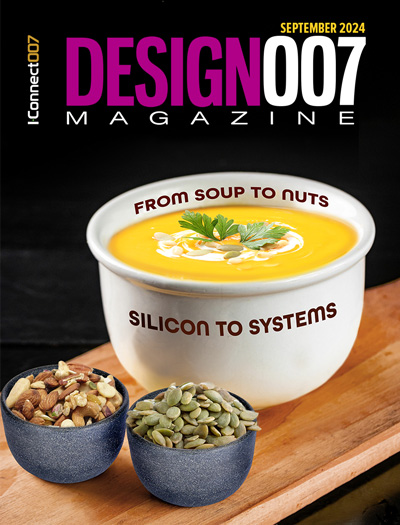-

- News
- Books
Featured Books
- design007 Magazine
Latest Issues
Current Issue
Rules of Thumb
This month, we delve into rules of thumb—which ones work, which ones should be avoided. Rules of thumb are everywhere, but there may be hundreds of rules of thumb for PCB design. How do we separate the wheat from the chaff, so to speak?

Partial HDI
Our expert contributors provide a complete, detailed view of partial HDI this month. Most experienced PCB designers can start using this approach right away, but you need to know these tips, tricks and techniques first.

Silicon to Systems: From Soup to Nuts
This month, we asked our expert contributors to weigh in on silicon to systems—what it means to PCB designers and design engineers, EDA companies, and the rest of the PCB supply chain... from soup to nuts.
- Articles
- Columns
Search Console
- Links
- Media kit
||| MENU - design007 Magazine
Shaun Tibbals and Electra Polymer: Finding the Silver Linings in COVID-19
July 9, 2020 | Nolan Johnson, PCB007Estimated reading time: 7 minutes
On July 8, Nolan Johnson spoke with Shaun Tibbals, sales and marketing director for Electra Polymers. Shaun discusses the Electra Polymer’s business outlook responses to the ongoing COVID-19 outbreak.
With approximately six months of experience working in a COVID-19 business environment, Shaun shares details on the extent of the stresses on Electra’s supply chain. Tibbals also shares insights and lessons learned in business operations, pointing out that some processes have been improved or optimized through the work-from-home experience. Finally, Nolan asks about any changes to Electra’s development roadmap as a result of the outbreak-related restrictions.
I-Connect007 continues to deliver original reporting and coverage of the electronics design, electronics manufacturing, and contract manufacturing industries, including up-to-date information from the companies, associations, and supply chains globally. Find the latest news and information at I-Connect007.com.
Related Link:
- To download this audio (mp3) file, click here.
AUDIO TRANSCRIPT:
Nolan Johnson: Hi, I’m Nolan Johnson with I-Connect007. And today, I’m talking with Shaun Tibbals, who is the sales and marketing director with Electra Polymers. Shaun, welcome.
Shaun Tibbals: Thank you.
Johnson: There certainly have been a number of challenging situations for us all in 2020, COVID-19 among them. How has Electra Polymers responded to these challenges?
Tibbals: Yes, you’re right. It certainly has been a roller coaster. With everything that’s going on in the world, I think it’s safe to say the IPC show seems a million miles away. We were all aware of COVID-19 back then and the impact it was having in China specifically, but none of us could anticipate the scale of what was lurking around the corner for the rest of us.
After the virus hit China, we made quite a few changes. We spoke to our suppliers, and it was critical that we maintained our supply channels with suppliers and customers. But, obviously, the pandemic then started to spread to other countries that, one by one, gradually imposed their own lockdown restrictions. At that stage, it was critical that the systems we put in place were there to maintain our own employee safety. But at the same time, we had to ensure continuity of supply and service to all of our customers on a global scale.
It was evident at the time, and I think this has been reported by quite a few of your listeners, that many of our customers were involved in making PCBs and parts for medical equipment, which were there to tackle COVID-19. From our side, that ranged from ventilators to antibody test devices. It was really important that the systems and measures that we did put in place were robust and weren’t going to let our customers down in any way at all. That was really important for us. Employee safety was paramount. But again, it was essential that we maintained continued continuity of supply to our customers.
Johnson: Shaun, what kind of impact did you see on your supply channels?
Tibbals: We’ve had a long-standing collaborative relationship with all of our suppliers. We’ve been in business now since 1984. And over those years, the systems and supply chain has become very robust. Obviously, shipping modes did need to change, so we had to work together with our suppliers to make sure that where supplies were scheduled to be by sea freight. Sometimes, we had to move those to air freight to make sure that we didn’t have any shortages or delays.
This was happening at an unprecedented time for us. We were running at record sales levels. Production was running at 50% higher than the same period in 2019, which in itself had been a bumpy year. There we were, trying to juggle production schedules and maintain good supplies of raw materials, all at a time where there was a huge amount of uncertainty about whether there was going to be good continuity. But our logistics people and suppliers really pulled together, and we had no issues at all. A couple of times, we had to move modes of transport from sea to air, or even to FedEx or DHL, but all the way through, we were able to maintain supply. That worked really well.
Johnson: You mentioned employee safety briefly, as well as supply channel changes. What has been the impact through the first half of 2020 on Electra’s operations?
Tibbals: We’ve had quite a few people move to working remotely or working from home. Administration jobs primarily can be done from home. And those staff working from home will continue to do so for the foreseeable future. Ultimately, we’re a technology company. We’re tasked with developing and manufacturing coatings for PCBs and semiconductors.
That means lab operations, manufacturing operations, and logistics. They have to carry on as normal. Those jobs cannot be done from home. Therefore, it was essential that a range of measures that were put in place to make sure that that happened smoothly and seamlessly. We end up with a workplace that certainly looks and feels very different to how it was this time last year. It’s very much about establishing new working habits, for most people, and adjusting our systems to cope with the new normal. Face masks, sanitizing stations, and Perspex screens between workstations have become pretty much part of our daily working life.
We are used to that now. So, yes, if you compare 2019 with 2020, you would see a very different workplace. But the employees have adjusted very well. Interestingly, we’ve seen quite a few positives come out of this. Having remote workers, and you may have seen this your side as well, forces you to review many procedures that are in place. What that’s done is we’ve ended up with quite a few streamlined processes now through reviews that have taken place. Different ways of working have forced and catalyzed that to be done. We’re sitting here in 2020, and although the workplace looks different, from an efficiency standpoint, we’ve seen some improvements.
Johnson: Have you seen any adjustments to your development roadmap?
Tibbals: Advances in solder mask technology and customer requirements don’t get put on hold because of COVID-19. All of that continues. Our customers still face the same problems. They still have the same technological demands, and they’re looking to their suppliers to offer solutions and improvements. That doesn’t go away. The move toward digital imaging and the need for faster throughput times and the implementation of the advantages associated with a fully additive process, such as inkjet solder mask, march on. Therefore, we’ve had to continue with that. And I’m pleased that our R&D people have been able to do that at full speed. Again, it gets back to working in different ways. We’re not able to visit the customers in the same way that we were. There are national travel and flight restrictions, which means that we can’t make those face-to-face visits and have those face-to-face conversations.
But what we’ve seen is that the use of video or telephone conferencing has resulted in some shorter milestones. If your next milestone is to have a face-to-face review, very often, that’s pushed back further than the workload could achieve. And what we found is with a more virtual way of working, we’ve set shorter deadlines, and these are being met. The frequency of interaction with our partners, albeit remotely and no longer face to face, is probably higher than it was before. Again, I think we’ve seen some positives come out of this, and the development roadmap hasn’t been impacted at all. If anything, we’re probably slightly further along that process than we may have been if we were working in traditional ways. I like to think every cloud has a silver lining, and we’ve definitely seen some positives.
Johnson: Any parting words or observations you’d like to share with the rest of the industry as we wrap up here, Shaun?
Tibbals: We’re working in an industry that is very innovative and adapts very quickly. Our customer base has done some amazing things faced with some huge challenges. I’m a firm believer that necessity is the mother of invention. And I think there is no better time to put that to the test, and we’re putting it to the test. We’re reaping some benefits from that. My advice would be don’t stand still; take advantage of what’s in front of you. It may appear to be a challenge, but it could be turned into an advantage.
Johnson: A great perspective. Shaun, thanks for taking the time to speak with us.
Tibbals: You’re welcome. Thank you very much for your time.
Johnson: I’m Nolan Johnson, and you’ve been listening to my conversation with Shaun Tibbals, sales and marketing director of Electra Polymers. Thanks for listening.
Suggested Items
PCB Design Software Market Expected to Hit $9.2B by 2031
11/21/2024 | openPRThis report provides an overview of the PCB design software market, detailing key market drivers, challenges, technological advancements, regional dynamics, and future trends. With a projected compound annual growth rate (CAGR) of 13.4% from 2024 to 2031, the market is expected to grow from USD 3.9 billion in 2024 to USD 9.2 billion by 2031.
IPC Issues Clarion Call for EU to Reclaim Leadership in Electronics Manufacturing
11/21/2024 | IPCIPC released a synopsis of its recent white paper, Securing the European Union’s Electronics Ecosystem. This condensed document presents a comprehensive overview of the current challenges in Europe’s electronics manufacturing industry and shares actionable steps to help the EU achieve a stronger, more autonomous ecosystem.
IPC Celebrates National Apprenticeship Week with a Focus on Electronics Manufacturing Excellence
11/19/2024 | IPCIPC, a leading global electronics industry association and source for industry standards, training and advocacy, is proud to announce its participation in National Apprenticeship Week, scheduled for November 17-23, 2024.
IPC Introduces First Standard for In-Mold Electronics
11/18/2024 | IPCIPC announces the release of IPC-8401, Guidelines for In-Mold Electronics. IPC-8401 addresses in-mold electronics (IME) technology, providing industry consensus on guidelines for manufacturing processes, part structures, material selection, and production test methods to integrate printed electronics and components into 3D smart structures.
Disruptive Innovation and Generative AI Inventor, Kevin Surace, to Keynote IPC APEX EXPO 2025
11/15/2024 | IPCEach year, IPC APEX EXPO features industry’s most dynamic, innovative minds to deliver keynote presentations that are both educational and entertaining. IPC APEX EXPO 2025 will feature Kevin Surace, an internationally renowned futurist and generative artificial intelligence (AI) innovator.


